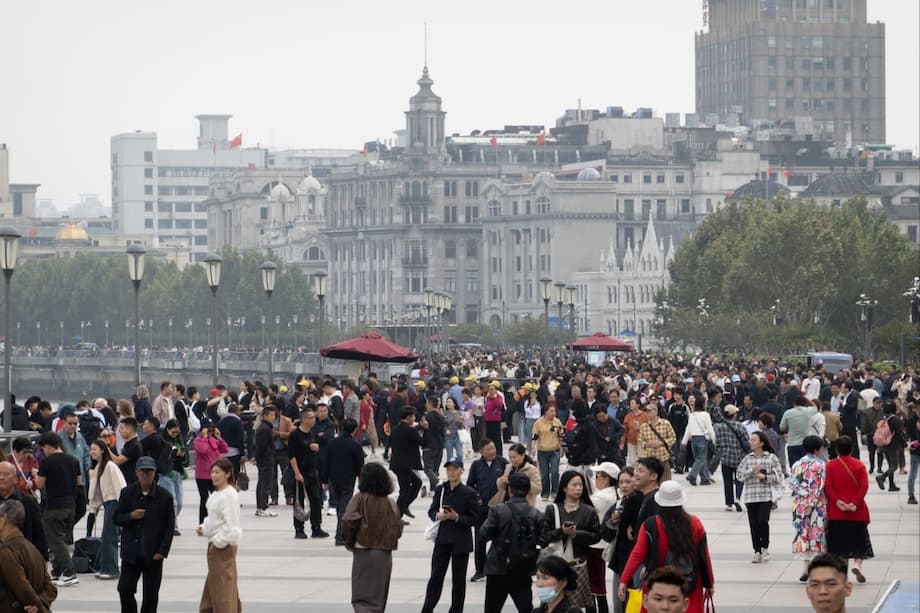China’s Super-Rich Target Shanghai’s Luxury Hotels: A New Wave of Investment
Shanghai, China’s bustling commercial and financial hub, is witnessing a striking shift in its luxury hotel investment landscape. As institutional investors such as insurers, real estate funds, and private equity firms adopt a cautious stance, China’s billionaire class is stepping in, snapping up prime hotel assets in the city’s most coveted locations. This trend, driven by a mix of economic stabilization, evolving consumer preferences, and the enduring allure of scarcity, is reshaping both Shanghai’s property market and the broader luxury hospitality sector.
- China’s Super-Rich Target Shanghai’s Luxury Hotels: A New Wave of Investment
- What’s Driving the Super-Rich to Invest in Shanghai’s Luxury Hotels?
- Shanghai’s Luxury Hotel Market in the Context of Asia-Pacific Trends
- Why Are Institutional Investors Taking a Back Seat?
- The Broader Impact: How Shanghai’s Luxury Hotel Boom Reflects Global Wealth and Lifestyle Trends
- Challenges and Opportunities Ahead
- In Summary
According to property consultancy JLL, high-net-worth individuals (HNWIs) and corporate investors accounted for a staggering 88 percent of luxury hotel transactions in Shanghai during the first half of 2025. Despite relatively low current returns—annualized yields on premier hotel properties hover around 2 to 3 percent—these investors are undeterred. Their focus is on the long-term scarcity value and resilience of core-area assets, a strategy that could inject much-needed confidence into Shanghai’s slumbering property market.
What’s Driving the Super-Rich to Invest in Shanghai’s Luxury Hotels?
Several factors are converging to make luxury hotels in Shanghai an attractive proposition for China’s wealthiest investors:
- Scarcity Value: Prime hotel properties in central Shanghai are limited, and their unique locations—often with cultural or historical significance—make them highly sought after. As Sun Ling, head of JLL’s capital markets division in East China, notes, “Investors’ concentrated allocation towards core-area assets reflects not only a stabilizing risk appetite, but also highlights the scarcity value and resilience of Shanghai’s core-area assets.”
- Economic Stabilization: After a period of uncertainty, China’s economy is showing signs of renewed stability. This has rekindled risk appetite among the super-rich, who see prime hotels as safe havens amid global geopolitical tensions and domestic market volatility.
- Changing Consumer Preferences: The rise of affluent millennials and Gen Z consumers in China is fueling demand for unique, memorable experiences. Luxury hotels—especially those with heritage value or distinctive design—are well-positioned to cater to this trend.
- Tourism Recovery: Easing of visa policies and a surge in both domestic and inbound tourism are boosting hotel occupancy and revenues, making the sector more attractive to investors.
These dynamics are playing out against a backdrop of broader shifts in China’s real estate and hospitality markets. The transaction value of office buildings, rental-home projects, shopping malls, and hotels in Shanghai slumped nearly 30 percent year-on-year to 23 billion yuan (US$3.2 billion) in the first half of 2025, according to CBRE. Yet, luxury hotels in prime locations have proven resilient, drawing the attention of those with the capital and patience to weather short-term market fluctuations.
Case in Point: Notable Deals and Market Movements
One of the most prominent recent transactions was Inner Mongolia Shilin Investment Group’s acquisition of the CitiGo Hotel in a Shanghai suburb for 300 million yuan. Meanwhile, major developers facing liquidity pressures have been offloading hospitality assets, leading to high-profile sales and rebrandings. For example, Wanda Group sold the luxury Wanda Reign hotel on the Bund for less than half its original price as part of a debt restructuring effort, while other properties like the Jiulong Hotel and New World Hotel have been rebranded under international flags.
This wave of asset sales, often at discounted prices, has created opportunities for China’s super-rich to acquire trophy assets that may appreciate significantly over time, especially as Shanghai’s tourism and business travel sectors recover.
Shanghai’s Luxury Hotel Market in the Context of Asia-Pacific Trends
Shanghai’s luxury hotel investment boom is not occurring in isolation. Across the Asia-Pacific region, the hotel and hospitality sector is undergoing structural transformation. According to CBRE and Colliers, several key trends are shaping the market:
- Resilient Investment Activity: Despite global economic headwinds and high interest rates, hotel investment in Asia-Pacific remains robust. Transaction volumes in the region are projected to reach around US$12.2 billion in 2025, with China recording some of the highest hotel investment growth—up 126 percent in the first half of 2024, second only to Singapore.
- Preference for Upscale and Branded Assets: Investors are increasingly drawn to upscale and luxury-branded hotels, which offer higher pricing power, brand recognition, and the ability to attract affluent travelers.
- Limited New Supply and Elevated Demand: The supply of new luxury hotels in prime locations is constrained, while demand is rising due to increased travel and changing consumer expectations. This dynamic supports higher room rates and occupancy levels.
- Focus on Experience, Wellness, and Sustainability: Modern luxury hospitality is defined by personalized experiences, wellness offerings, sustainability initiatives, and innovative design. Hotels that excel in these areas are commanding premium prices and outperforming competitors.
Major international hotel groups such as Marriott, Hilton, Accor, IHG, and Wyndham are aggressively expanding their presence in China, with dozens of new luxury and lifestyle hotels in the pipeline. IHG alone has signed 24 new hotel projects in Greater China in 2024, including several in Shanghai, reflecting the sector’s growth potential.
Demand-Side Dynamics: Who’s Staying in Shanghai’s Luxury Hotels?
The demand for luxury hotel stays in Shanghai is being driven by both domestic and international travelers. The city’s appeal as a global business and tourism destination, combined with its rich cultural heritage and vibrant culinary scene, makes it a magnet for affluent guests.
Interestingly, the affordability of luxury hotels in China—relative to other major Asian cities—has attracted a growing number of international visitors, particularly from Singapore. The strong Singapore dollar and intense competition among hotels have made high-end stays in Shanghai more accessible. For example, a night at the Hilton Shanghai City Center costs about half as much as a comparable stay in Japan, according to VnExpress International. This trend is echoed by rising flight searches and tour group bookings from Singapore to Chinese destinations.
Within China, younger travelers—especially millennials and Gen Z—are prioritizing unique experiences over traditional luxury. Surveys show that a majority of these consumers value memorable activities, driving spending on luxury lifestyles and hospitality. Hotels with cultural heritage, innovative design, and immersive experiences are particularly appealing to this demographic.
Why Are Institutional Investors Taking a Back Seat?
While China’s super-rich are actively acquiring luxury hotels, institutional investors remain cautious. Several factors explain this divergence:
- Concerns Over Oversupply: Some institutional investors worry about an oversupply of hotel rooms in certain markets, which could pressure occupancy rates and profitability.
- Market Volatility and Debt Issues: The broader real estate sector in China has faced liquidity and debt challenges, prompting institutions to adopt a wait-and-see approach, especially as developers offload assets to manage their balance sheets.
- Low Current Yields: With annualized returns on luxury hotel assets in Shanghai hovering around 2 to 3 percent, institutions may find the risk-return profile less attractive compared to other asset classes.
However, the entry of high-net-worth individuals and family offices is helping to stabilize the market, providing liquidity and supporting asset values. Their long-term perspective and willingness to accept lower short-term returns in exchange for scarcity and prestige are key differentiators.
Asset Repricing and Market Recovery
The influx of private capital has coincided with asset repricing, as distressed developers sell hotels at discounted rates. This has led to a vibrant transactions market in Shanghai, with more high-quality assets becoming available. According to Asia Property Awards, hotels recorded the strongest property investment growth in 2024, expanding 82 percent by mid-September compared to the previous year.
Government policies have also played a role in supporting the sector. Expanded visa-free policies have boosted inbound tourism, with overseas visitor arrivals surging 86 percent in the first 11 months of the year. Promotional campaigns and new hospitality-focused venues in Shanghai and other major cities are accelerating the formation of new retail and hospitality landscapes.
The Broader Impact: How Shanghai’s Luxury Hotel Boom Reflects Global Wealth and Lifestyle Trends
The surge in luxury hotel investment in Shanghai is part of a larger story about the rise of wealth in Asia-Pacific and the evolving preferences of affluent consumers. According to the Julius Baer Global Wealth and Lifestyle Report 2025, Asia-Pacific is home to some of the world’s fastest-growing populations of high-net-worth individuals, with China and India leading the charge. Shanghai ranks among the world’s most expensive cities for luxury living, and spending patterns among the region’s wealthy are shifting toward health, wellness, and unique experiences.
This aligns with global trends in luxury hospitality, where success is increasingly defined by:
- Personalized, Exclusive Experiences: Guests expect tailored services, curated cultural activities, and immersive local connections.
- Wellness and Sustainability: Hotels are investing in advanced wellness programs, sustainable operations, and environmentally conscious practices to meet guest expectations and regulatory requirements.
- Technological Innovation: The integration of AI and automation is enhancing guest experiences, from seamless check-ins to personalized recommendations, without sacrificing the human touch.
- Brand Loyalty and Recognition: Major hotel groups are expanding loyalty programs and offering more flexible, customizable benefits to attract and retain affluent travelers.
Industry events such as Hotel & Shop Plus 2025 in Shanghai are showcasing the latest innovations in hospitality design, technology, and guest experience, reflecting the sector’s commitment to quality and continuous improvement.
Challenges and Opportunities Ahead
Despite the optimism, Shanghai’s luxury hotel market faces several challenges:
- Intense Competition: Both domestic and international hotel brands are vying for market share, necessitating constant innovation and differentiation.
- Overcapacity in Some Segments: While prime locations remain supply-constrained, other areas may face overcapacity, leading to price competition and pressure on margins.
- Economic and Geopolitical Uncertainty: Ongoing global tensions and domestic policy shifts could impact investor sentiment and travel demand.
Nevertheless, the long-term outlook remains positive. The China Hotel Market is projected to reach $170.4 billion by 2033, up from $83.6 billion in 2024, with a compound annual growth rate of over 8 percent, according to GlobeNewswire. Key drivers include rising disposable incomes, urbanization, government support for tourism, and the continued expansion of global hotel brands.
For investors, the key to success lies in identifying assets with true scarcity value, embracing innovation in service and sustainability, and staying attuned to the evolving preferences of affluent travelers. As Shanghai continues to cement its status as a global luxury destination, those who can navigate the complexities of the market stand to reap significant rewards.
In Summary
- China’s super-rich are leading a new wave of investment in Shanghai’s luxury hotel sector, focusing on prime assets with long-term scarcity value.
- Institutional investors remain cautious due to concerns over oversupply, market volatility, and low current yields, but private capital is stabilizing the market.
- Broader Asia-Pacific trends—such as resilient investment activity, preference for upscale branded hotels, and a focus on experience and sustainability—are shaping Shanghai’s hospitality landscape.
- Demand for luxury hotel stays is fueled by both domestic and international travelers, with younger consumers prioritizing unique experiences.
- Asset repricing, government support, and the entry of high-net-worth individuals are driving a recovery in Shanghai’s hotel market.
- The long-term outlook is positive, with the China hotel market projected to double in size by 2033, supported by rising wealth, urbanization, and tourism.












